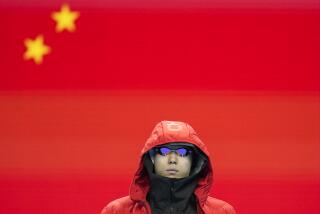Troubled Waters in Australia
- Share via
It was the indelible feel-good image of the 2000 Summer Olympics, one Australian swimmer after another diving into the pool in Sydney and emerging on the medal podium. Back then, in happier times, taking the plunge was a source of national honor and pride.
But that was before the bizarre events of April 1, no April Fool’s joke in Australia, when the splash of a safe smacking into a small pond may have inexorably changed everything.
The story unfolded with a burglary at the Canberra apartment of Olympic swim Coach Gennadi Touretski on April 1. Touretski, who immigrated to Australia from Russia, coaches at the Australian Institute of Sport (AIS) and for years has worked with Russian star sprinter Alexander Popov and Australian Michael Klim.
Inside the safe, recovered by authorities, were gold medals from his appreciative athletes and some tablets of the banned anabolic steroid stanozolol, the same drug that cost track sprinter Ben Johnson of Canada his gold medal at the 1988 Summer Games in Seoul.
Touretski, who has denied any wrongdoing, will appear in court Thursday in Australia, facing a charge under the Poisons and Drugs Act. The maximum penalty is six months in prison. He has been suspended, with pay, by AIS.
If there was any thought the potential drug scandal was an obscure matter, a quick review of the immediate reaction in Australia suggested otherwise.
Australia Prime Minister John Howard commented on it, vowing to maintain a “very strong line” on drugs in sports. Swimming legend Dawn Fraser called the matter a “bloody shame.”
Klim and other AIS swimmers held a news conference and reaffirmed their strong anti-drug stance. Two hundred and fifty swimmers at AIS are scheduled to undergo drug tests by the end of the week, and Klim has given permission to make his results public.
The splash into the pond may be more like the thud of a nation’s psyche.
“It’s more than just another drug scandal because the success of Australian swimming has become intertwined with national self-esteem,” Sydney Morning Herald columnist Richard Hinds said in an interview.
Swimmers and coaches from the United States and Australia have traditionally been the most outspoken on the issue of drugs in their sport. There was a major backlash against Australian distance star Kieren Perkins when he flippantly called American Gary Hall Jr. a “drug cheat” just before the Sydney Games. Hall had been suspended in the past for marijuana use, not performance-enhancing drugs.
“Australia has at least on the surface tried to lead the hunt for drug cheats elsewhere,” Hinds said. “They complain loudly and continuously about the ‘tainted’ Chinese program. It might be awhile before some Australian coaches start pointing the finger again.”
If the charges are proved true, and any of the top swimmers in Australia are implicated, Hinds said: “It would be the equivalent of them finding a 15th club in Tiger Woods’ bag.”
A spokesperson from USA Swimming said officials from the federation would not comment until receiving more information about the case. But prominent sports figures in Australia were lamenting the shadow that the scandal cast over the country’s beloved sport.
“Unfortunately, win or lose, there’s no bright side you can put on this,” Forbes Carlisle, coach of Australian star Shane Gould during the ‘70s, told the Daily Telegraph of Sydney. “The very accusation is a slur against us. We’ve been so outspoken about the transgressions of the Chinese and the Italians, they’ll be ready to bury us.
“It is a very black day for us--it weakens our voice in demanding the IOC and FINA [swimming’s international governing body] act against drugs.”
Concern and interest about the Touretski case is not limited to Australia. Dr. Steven Ungerleider, an American psychologist and author, just has completed a book to be released next month, “Faust’s Gold: Inside the East German Doping Machine.”
The book details the revelations of the legal proceedings against former German Democratic Republic (GDR) coaches, doctors and sports officials who confessed to conducting “ruthless and destructive medical experiments” on young Olympic-caliber athletes at training camps.
“It looks rather suspicious,” Ungerleider said of the Australian case. “We don’t know for sure. These are allegations. At first blush, it looks very suspicious that he’s the coach of these very prominent swimmers. It’s very unfortunate. It does cast a very dark cloud over the program.
” . . . It would be very disturbing if it turns out some of the kids were actually using [drugs] and bypassing the drug tests or somehow masking them . . . using some of the German technology to beat drug tests.”
More to Read
Go beyond the scoreboard
Get the latest on L.A.'s teams in the daily Sports Report newsletter.
You may occasionally receive promotional content from the Los Angeles Times.






